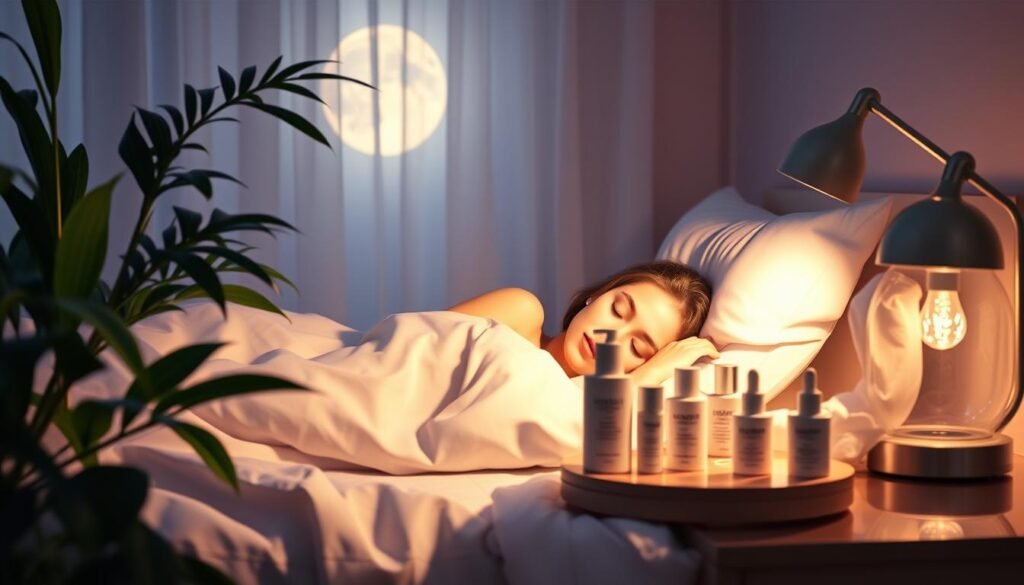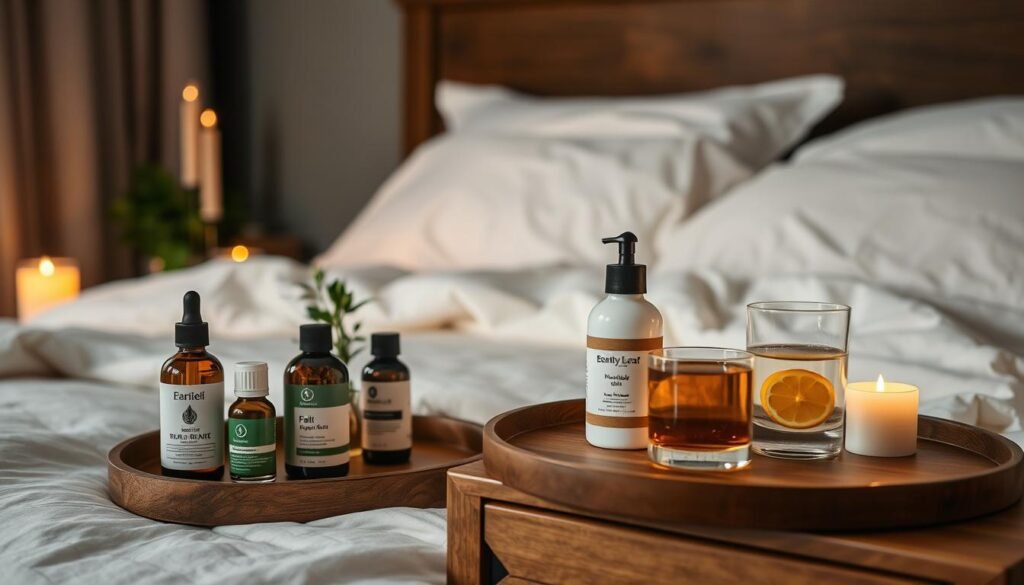Missing even one night’s sleep can boost cortisol, our stress hormone, which may cause skin issues like acne. This highlights how crucial Beauty Sleep is. It’s more than a beauty buzzword; it’s backed by science. Good sleep is key to refreshing not just our bodies but also our skin, leading to a healthy glow.
By sleeping well, we help our skin repair and rejuvenate itself. This prevents breakouts and keeps our complexion clear. Sleep keeps our hormones in check too, which is vital for clear, vibrant skin. For more insights into how sleep transforms your skin, click here.
Key Takeaways
- Beauty Sleep is vital for skin health and clarity.
- Lack of sleep can lead to increased cortisol levels, exacerbating acne.
- Quality sleep supports hormonal balance that affects skin vitality.
- Restorative slumber facilitates essential skin repair processes.
- A well-rested body contributes to a more radiant complexion.
The Science Behind Beauty Sleep
Did you know sleep and skin health are closely linked? A balance is maintained through our biology. Sleep affects many functions that make us look better. These functions help refresh our skin. They’re guided by our body clocks and the hormone melatonin.
Understanding Sleep Cycles
Sleep includes cycles of REM (Rapid Eye Movement) and non-REM stages. Each cycle is about 90 minutes. A good night’s sleep has four to six of these cycles. REM helps blood flow to our skin. Non-REM stages help our skin renew itself. Not sleeping well can harm our skin. This shows why a steady sleep routine is key for beautiful skin.
The Connection Between Sleep and Skin Health
How well and long we sleep affects our skin. At night, we make melatonin. This not only helps us sleep but also guards skin cells. It helps fix and renew skin, making it look better and stronger. Having a regular sleep schedule is important for great skin. Making sleep a priority can really improve how our skin looks.
| Sleep Cycle Stage | Duration | Effects on Skin |
|---|---|---|
| Non-REM Sleep | 75-80% of total sleep time | Cell repair and regeneration |
| REM Sleep | 20-25% of total sleep time | Increased blood flow to skin |
| Melatonin Production | Throughout the night | Protection against skin damage |
How Rest Affects Skin Renewal
Quality sleep is key for skin renewal. It lets the body repair cells during deep sleep. When you get enough rest, your skin improves because it regenerates overnight.
The Role of Sleep in Cell Repair
Sleeping well helps your skin renew itself. It does this by making new cells and fixing old ones. If your sleep is off, it shows on your skin as wrinkles and roughness. Good sleep keeps you looking young and repairs cells well.
Importance of REM Sleep for Skin Vitality
REM sleep is a big part of our sleep cycle and is crucial for skin health. During REM, our bodies make proteins, which are needed for collagen. Collagen keeps our skin strong. Not getting enough REM sleep can make your skin look tired.
Getting better sleep can improve your REM phases. This makes your skin healthier. Learn more about how rest boosts skin health here: How Rest Impacts Skin Health.
Beauty Sleep: Your Skin’s Best Friend
Beauty Sleep is crucial for your skin. At night, your body repairs itself, which is vital for healthy skin. Knowing about these repairs can show how good sleep boosts beauty and health.
Nighttime Repair Processes
While you sleep, your body boosts tissue growth and cell repair. This helps your skin rejuvenate. It helps recover from the day’s harm. Key parts of this repair include:
- Collagen Production: This keeps skin stretchy and reduces wrinkles.
- Cellular Renewal: It swaps old cells with new ones for a fresher look.
- Increased Blood Flow: Better blood flow feeds skin, giving it what it needs to glow.
How Sleep Deficiency Leads to Skin Issues
Not sleeping enough can cause skin problems. Signs of tiredness show as dullness, dark under-eye circles, and breakouts. Lack of sleep breaks the body’s repair cycle, leading to skin issues. Common problems include:
- Increased Acne: Unbalanced hormones can cause more oil and breakouts.
- Dryness and Flakiness: Skin loses moisture, becoming rough.
- Puffiness and Dark Circles: Bad circulation and holding water make you look older.

Acne and Sleep: A Complicated Relationship
The link between acne and sleep is complex. Lack of sleep affects both your body and mood. Research shows that not sleeping well makes it hard for the body to handle stress. This is important for keeping skin clear. Getting enough sleep can help reduce acne, which is good news for many people.
Stress Management Through Better Sleep
Stress can make hormonal levels change, leading to acne. Not sleeping enough raises cortisol levels, making you more stressed. This stress can cause more oil production. That can block pores and cause skin problems. Having a regular sleep schedule helps you relax and lowers stress. This is great for your skin.
Hormonal Changes Due to Lack of Sleep
Not getting enough sleep affects your hormones and your skin. Your sleep pattern impacts hormone levels and sebum production. Not sleeping enough can cause acne. Sleep is crucial for balancing hormones and keeping skin healthy. To learn more, check out this informative link.
| Factor | Impact on Acne |
|---|---|
| Lack of Sleep | Increases stress levels, leading to hormonal changes and more acne |
| High Stress | Elevates cortisol, boosting sebum production |
| Poor Sleep Quality | Compromises skin barrier function, exacerbating existing conditions |
Improving your sleep and stress levels can make your skin healthier. For those with acne, this could mean a clearer future. It is crucial to understand how these factors are connected. By making better choices in your lifestyle, you can improve your skin health.
Rejuvenating Rest and Anti-Aging Benefits
Sleep is crucial not just for our health right now but also for its anti-aging effects, especially on skin. Getting enough sleep boosts collagen production. This protein is key for keeping skin elastic and looking good.
How Sleep Impacts Collagen Production
In deep sleep, our bodies repair themselves and boost collagen production. This process fights skin aging, making it look fuller and more alive. A regular sleep pattern helps maintain this essential process, reducing fine lines and wrinkles.
Preventing Fine Lines and Wrinkles with Sleep
Enough sleep clearly helps avoid aging signs like fine lines and wrinkles. It gives our skin the chance to heal and refresh overnight. Studies show regular rejuvenating rest makes expression lines less visible, giving a younger look.
Skin Care Tips for Achieving Restorative Slumber
For better skin, good sleep is key. A peaceful bedtime routine boosts skin health. With the right sleep setup, your skin can improve overnight.
Creating a Relaxing Bedtime Routine
Getting ready for bed can signal your body to relax. Try these easy steps:
- Set a consistent sleep schedule to regulate body rhythms.
- Engage in calming activities such as reading or meditation.
- Apply a gentle skin care regimen, including moisturizers to hydrate the skin before sleep.
- Limit screen time an hour before bedtime to reduce blue light exposure.
The Optimal Sleep Environment for Skin Health
Creating the right sleep setting is crucial for skin renewal. Here’s what you need:
| Factor | Recommendation |
|---|---|
| Room Temperature | Maintain between 60°F to 67°F for improved comfort |
| Darkness | Use blackout curtains to minimize light exposure |
| Noise Level | Consider white noise machines or earplugs if needed |
| Air Quality | Keep the room well-ventilated and consider using a humidifier |

Enhancing Your Overnight Regeneration
To get the best results, focus on hydrating your skin at night. During sleep, our skin regenerates the most. Pre-sleep rituals are key for great skin care. Effective treatments support this important natural process.
Hydration and Nourishment Before Sleep
Hydration makes a big difference for your skin. Before bed, try using hydrating products like serums or oils. Ingredients like hyaluronic acid and glycerin are amazing for keeping moisture in. They keep your skin looking full and bright all night.
The Benefits of Sleep Masks and Treatments
Sleep masks are a big hit for nighttime skin care. Their rich formulas deeply hydrate and target skin issues while you sleep. These masks pack powerful ingredients that fix and renew skin. They also protect against dryness. Using them regularly makes your skin look and feel better.
| Type | Main Benefits | Key Ingredients |
|---|---|---|
| Hydrating Serum | Boosts moisture retention | Hyaluronic acid, glycerin |
| Sleep Mask | Deep nourishment overnight | Aloe vera, peptides |
| Night Cream | Supports skin barrier repair | Retinol, ceramides |
| Overnight Oil | Provides essential fatty acids | Jojoba oil, rosehip oil |
Adding these products to your nightly routine can greatly improve skin hydration. By morning, your skin will look and feel refreshed and rejuvenated.
Achieving a Youthful Glow Through Proper Sleep
Good sleep is key to keeping skin young. It helps the skin fix itself, turning it clearer and more radiant. At night, some skincare products do their magic by using the body’s repair time.
Skin Care Products That Work Overnight
Nighttime skin care products can make a big difference. They use ingredients like retinoids and peptides to target skin problems. By morning, they help your skin look fresh and young. Here’s what to look for:
- Moisturizers rich in hyaluronic acid
- Retinol-based creams for tackling fine lines
- Specialized serums targeting pigmentation
- Sleep masks designed for deep hydration
The Impact of Sleep Quality on Complexion
Better sleep means better skin. It helps the skin heal from daily damage, reducing pimples and spots. Good sleep boosts the skin’s defenses, lowers inflammation, and keeps skin healthy. For more tips, check out sleep and beauty guides.
Using the right skincare with enough sleep can transform your skin overnight. This combo brings out a youthful shine.
Conclusion
Beauty Sleep deeply affects our skin health. Good sleep keeps your skin looking fresh and helps with skin care. By sleeping well, our skin gets to fix itself and look better.
Getting enough sleep also helps balance our hormones. This means less stress and fewer acne problems. Taking care of our sleep is key for healthy skin and feeling good inside.
Good sleep is crucial for amazing skin health. It can change your beauty routine in big ways. If you want glowing, young-looking skin, don’t skip on Beauty Sleep.